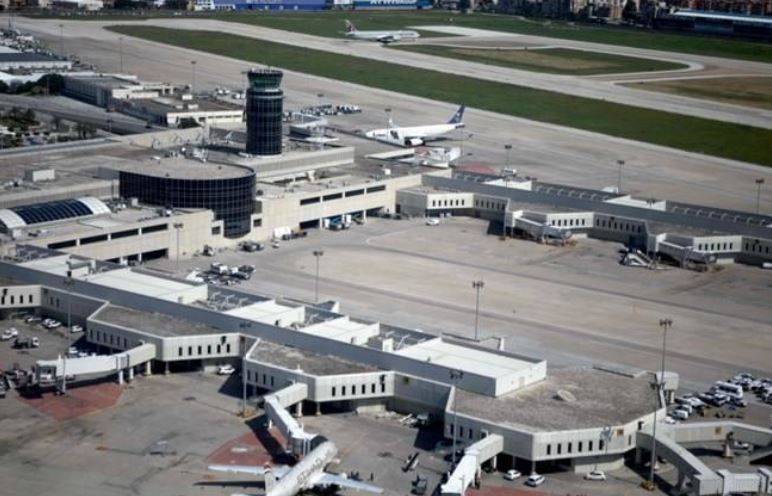
An aerial picture taken on March 7, 2020, shows a view of Rafik Hariri International Airport in Beirut. (Credit: Patrick Baz/AFP)
Caretaker Public Works Minister Ali Hamieh on Thursday backtracked plans to add a second terminal, fully financed by an Irish company, to the Beirut international airport after a slew of criticism regarding the project’s legality escalated into requests to open investigations, both locally and abroad. The project had been established through a mutual agreement rather than a tender process.
Here’s a quick recap of what happened between the announcement of the project and its cancellation within 10 days, in another blunder of the current political elite:
• On Monday, March 20, Hamieh announced plans to construct a second terminal at the Beirut international airport. Hamieh said that, due to the unavailability of public funds for the project, the ministry resorted to foreign funding to support what he called a pillar of the national economy: semi-private Irish company Dublin Airport Authority International would finance the terminal’s construction, estimated at over $122 million, and receive the entirety of the profits generated by it for 25 years after its completion, projected for 2027. The minister said the Lebanese Air Transport company would manage the new terminal, which he said is needed to unburden the overcrowded airport by accommodating an additional 3.5 million passengers per year, supplement the economy with fresh foreign funds and create around 2,500 jobs.
• The announcement drew praise from officials and stakeholders in the tourism sector but also raised questions surrounding its legality. A public procurement expert told L’Orient Today that without Parliament approval granting a public asset to a private company, “all public contracts are competitive and must therefore automatically go through a tender process.” On Wednesday, March 2, the director of the Public Procurement Authority, Jean Elliye, issued a document request to review the project’s legality. The same day, Hamieh held a second press conference expounding the legality of the project, relying on legal texts and similar contracts previously undertaken by the Lebanese state.
• On Friday, March 24, the Court of Auditors also issued a document request to review the project while 10 civil society organizations published a joint statement condemning the plans as a violation of the public procurement law.
• This week, legal pressure against Hamieh’s proposal ramped up with both local and international requests for inquiry. On Tuesday, Kataeb MP Salim Sayegh proposed the formation of a parliamentary committee to investigate the plans. On Wednesday, the European Observatory for the Integrity of Lebanon, a transnational NGO advocating for the establishment of transparency and justice in Lebanon, called on the specialized division of Ireland's national police force that investigates economic crimes, the Garda National Economic Crime Bureau, to investigate the agreement, under the The Irish Corruption Act 2018 and European Union legislation.
• Today, Hamieh announced that “there will be no continuation of this contract [and] that [it] will be considered nonexistent.” The backtracking might not have exonerated Hamieh, however, as Sayegh has called for a “judicial inquiry” targeting the “criminal intent” behind the project, even if the minister “has backtracked on his mistake.”
Compiled by Abbas Mahfouz